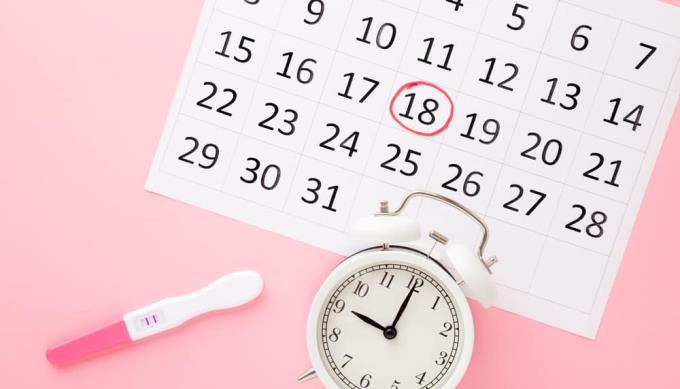The correct pregnancy test is not considered a big question for most women when using. In fact, there are many both subjective and objective factors affecting the accuracy of this instrument.
Knowing the accuracy of the pregnancy test will help you know the features of the product you are using and avoid making common mistakes when using this tool. The following article of aFamilyToday Health will accompany you to find the answer to wonder if the pregnancy test is correct!
The mechanism of action of the pregnancy test
A pregnancy test shows results by measuring the amount of hCG hormone in the urine.
The hCG hormone is also known as the pregnancy hormone or pregnancy hormone because it is created when the cells that function to form the placenta and provide nutrition for the developing embryo in the body. hCG is released when the egg is fertilized and attaches to the lining of the uterus. hCG can appear in the blood and urine for about 10 to 14 days after conception is successful. HCG levels are usually highest by 8 to 11 weeks of age.
The pregnancy test will be negative if the hCG is less than 5 mIU / ml and the positive result is when the hCG is 25 mIU / mL or higher.
Pregnancy test is correct?
The answer to the question of whether the pregnancy test is correct, according to the American Pregnancy Association, the pregnancy test can give results up to 97% accurate. The Mayo Clinic and WebMD believe that the accuracy of the pregnancy test is even higher, up to 99%. Overall, both of these numbers suggest that you can trust the results of the pregnancy test.
However, there will still be cases where a pregnancy test strip gives false results. This happens largely from its use, very rarely due to the quality of the pregnancy test.
5 causes inaccurate pregnancy test
There are many reasons that unknowingly lead to incorrect results on the pregnancy test. These can be due to:
1. The timing of using the pregnancy test is too early

The correct results of using a pregnancy test will not be affected much by the timing of the pregnancy test. If you have a regular menstrual cycle , about a week after you notice you're late, you can use a pregnancy test. Under normal circumstances, about 7-14 days after you have sex, you can also use a test to check if you are pregnant.
Note that using the test too early will affect the accuracy of the test results due to the low hCG and undetectable pregnancy test. Most likely, the result on the test stick only has 1 bar, but in fact, you are pregnant.
2. When to read the results
Pregnancy tests usually take about 5 minutes to show accurate results. Therefore, if you are too impatient and read the results as soon as you try it, this could inadvertently cause you to get the wrong result. Please wait patiently for a few minutes to get the most accurate results.
3. Read wrong results
Sometimes the results on the pregnancy test will not show a line or two, but there will be an additional dark line, a light line or two blurred lines. It is possible that the results of the pregnancy test will change with each test.
4. Effects of pregnancy complications
This is also a factor affecting the accuracy of the pregnancy test. Because, in some cases, the test strip gives two-mark results, but in fact you are not pregnant. It may be because you have had some common complications of pregnancy such as a false pregnancy, an ectopic pregnancy or an early miscarriage (i.e., there are still signs of hCG in the urine, but no living embryo).
5. Influence from currently used drugs

According to Medical News Today, a number of drugs that can affect the results of a pregnancy test include:
Paracetamol is used to treat allergies
Medicines for Parkinson's disease
Sleeping pills
Some antipsychotics, including chlorpromazine
Opioid pain relievers, such as methadone
Sedative
Anticonvulsants, including treatment of epilepsy
Medicine for infertility treatment
Diuretic
If you are taking the above drugs, consult a specialist or treating doctor before attempting a pregnancy test.
In addition, contrary to the belief of many people, blood alcohol concentration will not affect the hCG hormone level nor the accuracy of the pregnancy test.
However, if you are trying or hoping to become pregnant, you should avoid drinking alcohol as it can affect your baby's development . Pregnant mothers drinking alcohol in the early stages of pregnancy can also increase the risk of miscarriage, premature birth and low birth weight fetus.
How to use pregnancy test to ensure high accuracy?

To avoid getting false pregnancy test results, you should have a good understanding of how to use and read test results before deciding to take pregnancy test. This will help you to avoid confusion or panic if the result on the pregnancy test is not clear and promptly detect the status of the pregnancy to initiate better pregnancy health care.
It's an easy to use pregnancy test tool, but there are still things you should be aware of when using a pregnancy test so you don't get false results. Hope the above information has helped you answer the question about whether the pregnancy test results are correct.
In addition, if you and your wife have tried for a long time and have a few pregnancy tests but have not received the good news, please refer to 7 easy-to-conceive tips from aFamilyToday Health as well as common mistakes that make it difficult to conceive to be able to welcome your baby to the family soon.














